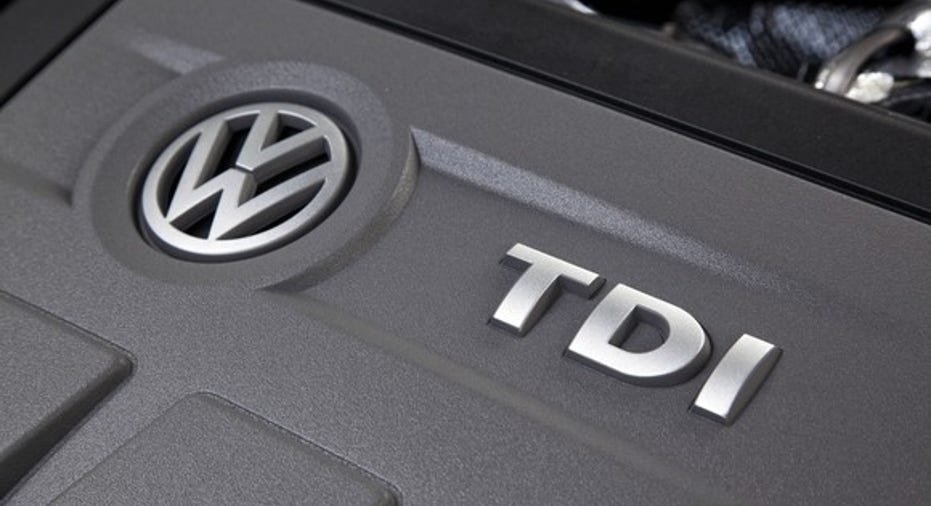Why Volkswagen Might Pay Billions to Settle Criminal Charges

Image source: Volkswagen.
Volkswagen (NASDAQOTH: VLKAY) has held preliminary settlement talks with the U.S. Department of Justice about resolving a criminal investigation into VW's diesel-emissions cheating scandal, according to new reports.
Any settlement will likely involve a fine of over a billion dollars, adding another hit to the spiraling costs of VW's decision to cheat on emissions tests.
The Feds found evidence that VW committed crimes
The Wall Street Journal reported that the Justice Department's ongoing investigation of VW has found evidence of criminal wrongdoing. VW's lawyers and Federal prosecutors have begun the process of negotiating a settlement that could result in "significant financial penalties," the Journal said.
How significant is "significant"? That will depend on the course of the negotiations. According to the report, prosecutors have yet to decide whether to seek a guilty plea from VW or to pursue a "deferred prosecution agreement."
Under a deferred prosecution agreement, the government agrees to dismiss criminal charges after a set period of time if the automaker adheres to the terms of the settlement over the period.It wouldn't be a surprise if prosecutors opted for this. Both Toyota (NYSE: TM) and General Motors (NYSE: GM)entered into deferred prosecution agreements with the Justice Department in order to resolve investigations related to safety lapses. But it's possible that the nature of VW's offenses will lead prosecutors to seek a harsher punishment than those imposed on Toyota and VW.
The precedents: How GM and Toyota settled criminal charges
Under its 2014 deferred prosecution agreement with the Justice Department, Toyota paid $1.2 billion and agreed to a set of reforms to resolve a criminal investigation into its actions around recalls that followed "unintended acceleration" issues in 2009 and 2010. GM paid $900 million and agreed to ongoing monitoring last year, in a deferred prosecution agreement that resolved charges related to its ignition-switch recalls. Both companies agreed to accept three years of oversight by independent monitors.
Significantly, the CEOs of both Toyota and GM made a point of publicly expressing regret for their companies' mistakes. Both companies explained in detail what had gone wrong, and promised (formally, as part of their settlement agreements) to make substantial changes to avoid similar mistakes in the future.
But it's possible that VW will have to pay more than Toyota paid, for a couple of reasons.
Why VW's fine could be bigger than Toyota's
First, VW hasn't quite owned up to its actions yet: While CEO Matthias Mueller has expressed regret for the cheating, and VW agreed to a huge settlement to compensate U.S. car owners and settle civil charges, the company has yet to give a full explanation of exactly what happened -- and it has yet to name the people responsible for deciding to program VW's cars to give false readings on government emissions tests.
Something else that could weigh against VW: The problems at Toyota and GM were seen largely as mistakes -- failures of internal systems (with some deliberate actions to cover up the mistakes after the fact). Volkswagen, on the other hand, appears to have deliberately committed crimes from the start.
The upshot: Another big payment for VW's decision to cheat is likely
The settlement that VW reached in June with U.S. regulators, and attorneys representing U.S. owners of the affected cars, could cost it as much as $15.3 billion. The settlement with the Justice Department won't be nearly as expensive, though it seems likely that it will come in north of a billion dollars.
There could be other ramifications for VW: Federal prosecutors have said that their investigation involves individual VW employees. It's possible that some will face Federal charges, but they would need to be extradited from Germany first. It's possible that a settlement could head off those extradition efforts -- but that would almost certainly add more dollars to the total fine.
It's not clear when a settlement will happen. But the shape of it is starting to emerge, and what is clear now is that it will be yet another ten-figure hit to VW for its ongoing cheating scandal.
A secret billion-dollar stock opportunity The world's biggest tech company forgot to show you something, but a few Wall Street analysts and the Fool didn't miss a beat: There's a small company that's powering their brand-new gadgets and the coming revolution in technology. And we think its stock price has nearly unlimited room to run for early in-the-know investors! To be one of them, just click here.
John Rosevear owns shares of General Motors. The Motley Fool recommends General Motors. Try any of our Foolish newsletter services free for 30 days. We Fools may not all hold the same opinions, but we all believe that considering a diverse range of insights makes us better investors. The Motley Fool has a disclosure policy.



















